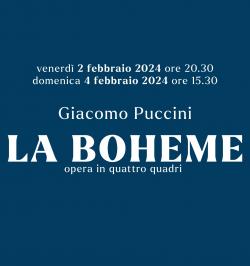
With 79 performances in 122 years - the first in 1897, the last in 2019 -, Giacomo Puccini’s Bohème is among the first five operas most performed in the Theatre of Pisa. Now, Friday 2 (8.30 pm) and Sunday 4 February (3.30 pm), this masterpiece by Puccini, gay and dramatic fresco of the Parisian youth of 1830, will be for the eightieth time on the stage of Verdi (as the fourth title of the Opera Season) in the revival of the staging of the Ravenna Festival-Teatro Alighieri (2015) with the direction of Nicola Paszkowski on the podium of the Orchestra Giovanile Cherubini and the direction and staging of Cristina Mazzavillani Muti.
Mimì, the 'gaia fioraia' by destiny, will be Elisa Verzier, soprano from Trieste at her debut in this role and already appreciated by the Pisan public as Norina in the Don Pasquale of the 2022-Season23 and like Tebaldo in Verdi’s Don Carlo at the opening of the season at La Scala in December 2023. In the role of the penniless poet Rodolfo there will be Alessandro Scotto di Luzio, while the couple Musetta/ Marcello will be interpreted by Alessia Pintossi and Christian Federici. In the other roles Clemente Antonio Daliotti (Schaunard), Andrea Vittorio De Campo (Colline), Fabio Baruzzi (Benoît), Graziano Dallavalle (Alcindoro, sergeant of customs officers), Ivan Merlo (Parpignol).
The virtual scenes are inspired by the imagination of the painter Odilon Redon, created by visual designer David Loom, video programmer Davide Broccoli and lighting designer Vincent Longuemare. The costumes are by Manuela Monti.
On stage there will also be the Municipal Choir of Piacenza directed by Corrado Casati and, for the occasion, two artistic realities of the city of Pisa: the Coro Voci Bianche Bonamici directed by Angelica Ditaranto and the Banda della Società Filarmonica Pisana directed by Paolo Carosi.
Tickets for both performances are almost sold out. Info: 050.941111
As is customary, before the performance, Thursday 1 February at 18 in the Foyer, the Theatre proposes to the public a moment of introduction and deepening with the Opera Guide that on this occasion will be conducted by Master Riccardo Mascia and will be followed by an aperitif offered by the Foundation.
"It will be a Bohème imbued with an ironic spirit, disenchanted and sometimes even fierce and pitiless, as if the typical atmospheres of Symbolism dragged us into the gloomy and claustrophobic ones of Expressionism, presage of the horror of the world war that would follow shortly", comments Cristina Mazzavillani Muti in presenting this co-production of the Foundation Theatre of Pisa re-organization of the Ravenna Festival in coproduction with Teatro del Giglio of Lucca, Amintore Galli Theatre of Rimini, Teatro Comunale of Ferrara.
First performed on 1 February 1896 at the Teatro Regio in Turin and directed by Arturo Toscanini, then twenty-nine, the Bohème is an opera in four paintings whose libretto by Giuseppe Giacosa and Luigi Illica is based on the novel by Henry Murger "Scènes de la vie de bohème".
After the lukewarm success of the Prima, the subsequent performances gave Puccini his international consecration. The love story between Rodolfo and Mimì takes place in Paris in 1830, between the cold attic that the poet shares with three other penniless friends (the painter Marcello, the philosopher Colline and the musician Schaunard), the Latin Quarter with the Café Momus and the Barriere d'Enfer, customs barrier of the Parisian wall. It’s Christmas Eve and the four friends, although penniless, decide to go to celebrate at the Momus Cafe. Rodolfo remains alone in the house to conclude a text and promises to join them shortly after, when Mimì arrives in search of help to rekindle the light that has been turned off. Love was born between the two on the famous arias Che gelida manina, Mi chiamano Mimì, O soave fanciulla. Their life will continue together until Rodolfo, jealous but also very worried about the health of the girl affected by the consumption, He decides to leave her to allow her a more comfortable and healthy life away from her 'shabby den' with the 'fire extinguished'. Mimì’s health will continue to worsen until, back to see Rodolfo and surrounded by friends, she dies.
The debut of this opera on the Pisan stage is given in the Lenten Season of the year following the world premiere: March 13, 1897 'at 8 o'clock precise'. Followed by 15 performances.
In the roles, then, there were Maria Stuarda Savelli (Mimì), Maria Martelli (Musetta), Salvo Pambianchi (Rodolfo), Enrico Broggi Muttini (Marcello), Francesco Bartolomassi (Schaunard), Natale Cervi (Colline). Directed by Antonio Palminteri.
Among the great names of artists who have sung in the leading roles are Giuseppe Di Stefano (Rodolfo in the 1953 Premiere) and Cecilia Gasdia (Mimì in 1989).
Box office: Tuesday to Saturday 11 -13 ; Tuesday, Thursday and Saturday also 16 -19
telephone purchase 050 941188: from Tuesday to Saturday 9 -11; Tuesday, Thursday and Saturday also at 14 -16
online purchase on www.vivaticket.com
Information: +39 050 941111